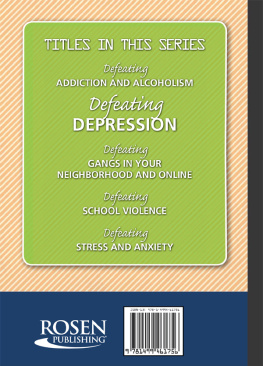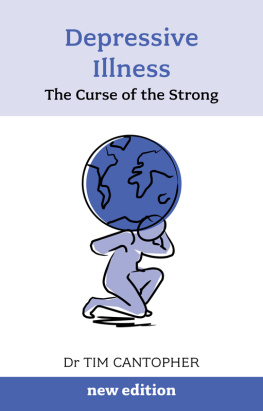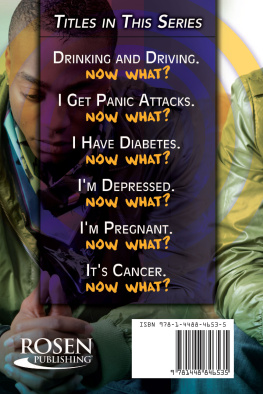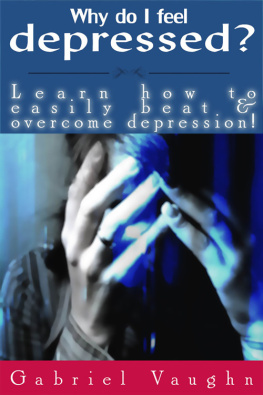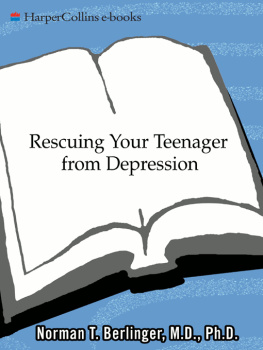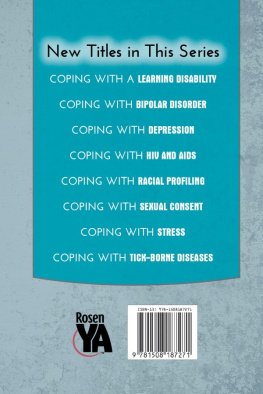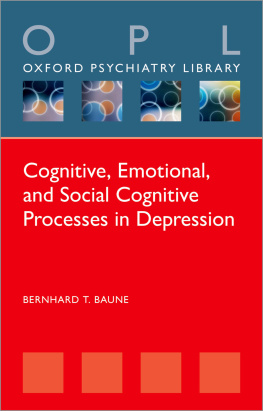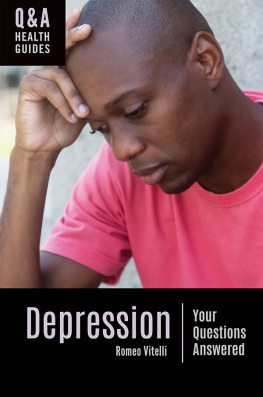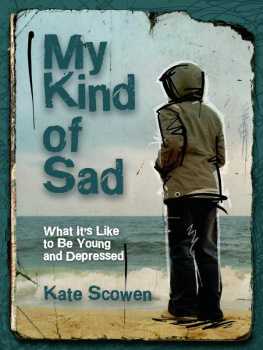Defeating depression
Defeating depression

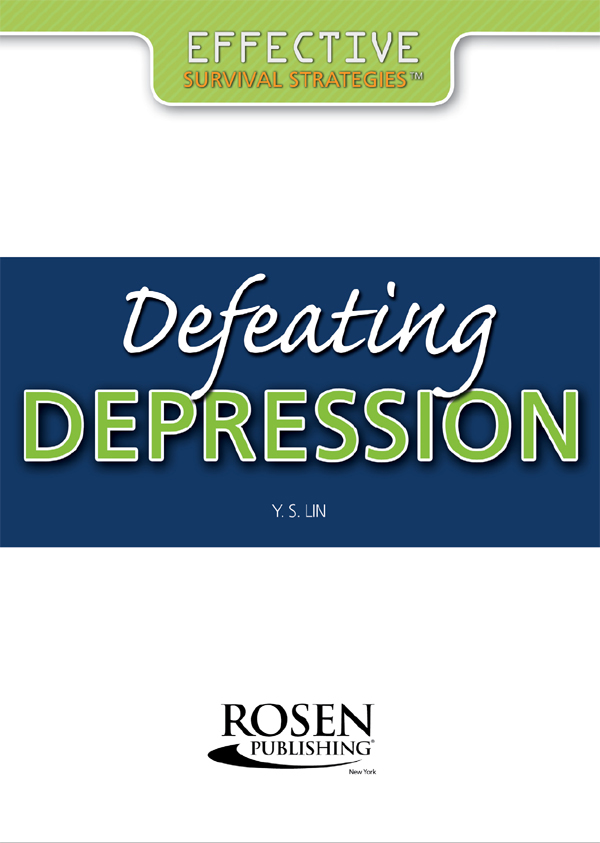
Published in 2016 by The Rosen Publishing Group, Inc.
29 East 21st Street, New York, NY 10010
Copyright 2016 by The Rosen Publishing Group, Inc.
First Edition
All rights reserved. No part of this book may be reproduced in any form without permission in writing from the publisher, except by a reviewer.
Library of Congress Cataloging-in-Publication Data
Lin, Y. S.
Defeating depression / Y. S. Lin. First edition.
pages cm. (Effective survival strategies)
Audience: Grades 712.
Includes bibliographical references and index.
ISBN 978-1-4994-6175-6 (library bound)
1. Depression in childrenJuvenile literature. I. Title.
RJ506.D4L56 2016
618.928527dc23
2015025085
For many of the images in this book, the people photographed are models. The depictions do not imply actual situations or events.
Manufactured in China
Contents
Introduction
B eing a teen is very demanding. Keeping up with homework, going through puberty, and dealing with unfamiliar emotions is challenging enough. But many teens today also work part-time, babysit younger siblings, help with chores, resist peer pressure, deal with cyberbullying, participate in extracurricular activities, and find time to hang out with family and friends. That is a lot to juggle! It is no wonder that teens occasionally feel tired, stressed out, or even a bit down. These are normal feelings that all people face from time to time.
It is when you start to feel sad or more tired than usual for weeks on end, no longer enjoy favorite activities, or begin to have feelings of worthlessness or hopelessness that you need to pay more attention to what is going on. These are all possible warning signs of a serious medical condition called depression. It is important to know that when someone suffers from depression, it does not mean that the person is crazy. It also does not mean the person is weak, lazy, or bad. Many successful people have suffered from depression at some point in their lives. Demi Lovato, Brad Pitt, J. K. Rowling, Charles Darwin, and Abraham Lincoln are just a few famous people who have accomplished impressive things despite having battled depression.

Many teens experience high levels of stress. A survey by the American Psychological Association found that the top sources of stress for teens are school and deciding what to do after graduation.
What having depression does mean is that a person needs help, just as one would go to the doctor when suffering from migraines or chronic stomach pains. If you are diagnosed with depression by a health professional, there is help out there and you can get better. Keep in mind that if you suffer from depression, you are not alone. According to the National Institutes of Mental Health (NIMH) website, more than one in ten adolescents suffer from a depressive disorder before they reach the age of eighteen. Some experts believe the number is higher. Depression has been shown to affect girls and boys of all different ages and backgrounds. Anyone can suffer from depression, even people who you think are attractive, popular, and smart.
Depression is something human beings have been aware of for thousands of years. Hippocrates, a great physician in ancient Greece, described what we call depression today as an illness. For thousands of years, views on depression ranged from the incomplete to the ignorant. Many different treatments were concocted. Sadly, for those suffering from depression in the past there was little hope of getting better.
Fortunately, depression is better understood today. There are trained professionals who help teens suffering from depression. There are also medications that can dramatically lessen the symptoms. Furthermore, there continue to be advances in science revealing more about what causes depression and hinting at promising new treatments on the horizon. Additionally, in the United States, there now exists a law called the Mental Health Parity and Addiction Equity Act. This means that health insurance companies and government health programs must treat mental health issues as they would any other illness, like diabetes or arthritis. This legislation makes treatments for depression accessible to more people.
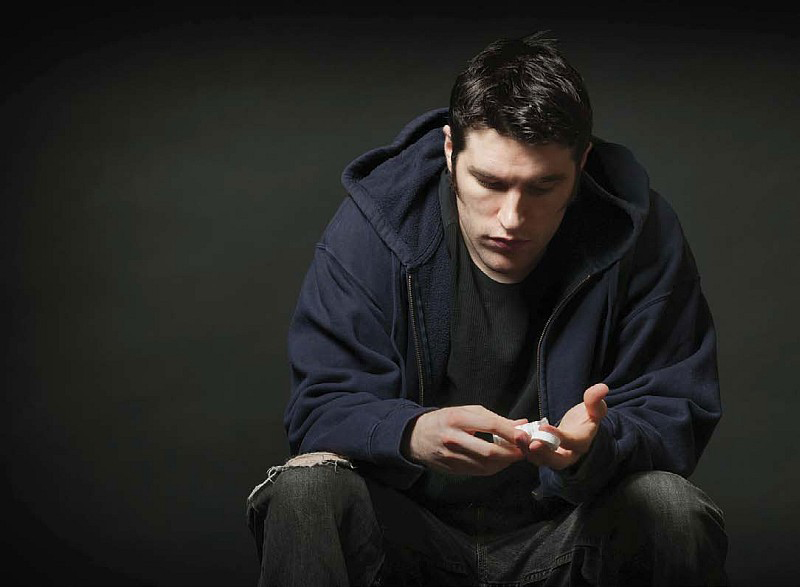
Depression is a serious problem. You can get better if you suffer from depression, but you need expert help. Trying to tough it out, ignoring the problem, or self-medicating is dangerous and can make things much worse.
If you think you might be suffering from depression:
DONT hide it.
DONT try to tough it out.
DONT ignore it and hope that it will go away on its own.
Depression is a serious problem, and you need help to get better. This resource will help you get an understanding of what depression is, which symptoms are most common among teens, which online and offline resources are best for you and your family, and most important, how you can get help today and start on a confident path to feeling better and stronger.
CHAPTER 1
WHY DO I FEEL SO DOWN?
I am so depressed. It is a phrase that is often casually used to describe feeling temporarily disappointed, frustrated, or unhappy. Most of us have uttered these words countless times. But saying you are depressed about something is vastly different from having a depressive disorder. Having a depressive disorder, or what people often generally call depression, is not a fleeting mood. Its a painful illness that needs to be treated.
Kinds of Depressive Disorders
There are many depressive disorders. Some, like seasonal affective disorder and postpartum depression, affect people during certain times of the year or at specific phases of their lives. Major depression is the most common form of depression. Others include persistent depressive disorder and bipolar disorder, which though less common is a serious form of mental illness that can be difficult to diagnose in teens.

Depression is a common, but complex, problem that comes in different forms. If you look at the ADAA website, there are eight different types of depression listed. The most common one is major depression.
Major depression is by far the most common of the depressive disorders. Unless indicated, most of the times when we mention depression in this resource we are referring to this illness. According to the NIMH website, about 7 percent of the adult population suffers from it at any given time. According to the same source, in 2012 about 9 percent of people between the ages of twelve and seventeen suffered from major depression. This means that if you walked into a classroom of thirty of your classmates, chances are that around three people would be struggling with symptoms of major depression at that time. The Anxiety Disorders Association of America (ADAA) website states that almost one in five Americans will suffer from major depression at some point in his or her life.

